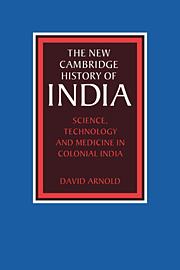Book contents
- Frontmatter
- 1 Introduction: science, colonialism and modernity
- 2 Science under the company
- 3 Western medicine in an Indian environment
- 4 Technologies of the steam age
- 5 Imperial science and the Indian scientific community
- 6 Science, state and nation
- Conclusion
- Biographical notes
- Bibliographical essay
- Index
- THE NEW CAMBRIDGE HISTORY OF INDIA
- References
6 - Science, state and nation
Published online by Cambridge University Press: 28 March 2008
- Frontmatter
- 1 Introduction: science, colonialism and modernity
- 2 Science under the company
- 3 Western medicine in an Indian environment
- 4 Technologies of the steam age
- 5 Imperial science and the Indian scientific community
- 6 Science, state and nation
- Conclusion
- Biographical notes
- Bibliographical essay
- Index
- THE NEW CAMBRIDGE HISTORY OF INDIA
- References
Summary
In Stockholm on 10 December 1930, C. V. Raman received the Nobel Prize for Physics for ‘the discovery of the effect named after him’. The prize had previously been awarded to such renowned physicists as Marie Curie, Albert Einstein and Niels Bohr, but never before to a non-European. Ronald Ross won the Medicine Prize in 1902, and Rabindranath Tagore, the only other Indian to receive a Nobel Prize before 1947, the Literature Prize in 1913, but it had long been seen as a matter for regret, as one Indian observer put it in 1912, ‘that none of our country’s scientists have up till now been awarded this much coveted prize’. He hoped that in the near future at least one of his compatriots would win ‘this blue ribbon in science’ and so achieve ‘the regard of the world’. That winter’s afternoon in Stockholm in 1930 it seemed Indian science had finally won that ‘regard’.
Along with the acclaim for Bose’s work on electric waves in London in 1896 and the founding of the Indian Science Congress in 1914, Raman’s Nobel Prize in 1930 could be seen as a symbolic milestone in the emergence of national science in India, the point at which it finally broke free from British tutelage and control. Certainly, by the 1920s and 1930s science in India had attained a new maturity and authority and Indian scientists had begun to acquire both international recognition and positions of intellectual and institutional leadership within India. And yet, in many respects, India’s science remained constrained and conditioned by the continuing presence of colonial rule and troubled by uncertainties about status and identity in India’s quest for nationhood and modernity.
- Type
- Chapter
- Information
- Science, Technology and Medicine in Colonial India , pp. 169 - 210Publisher: Cambridge University PressPrint publication year: 2000



